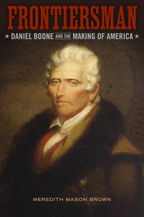
424 pages / 6.12 x 9.25 inches / 24 Halftones, 8 Maps
The name Daniel Boone conjures up the image of an illiterate, coonskin cap-wearing patriot who settled Kentucky and killed countless Indians. The scarcity of surviving autobiographical material has allowed tellers of his story to fashion a Boone of their own liking, and his myth has evolved in countless stories, biographies, novels, poems, and paintings. In this welcome book, Meredith Mason Brown separates the real Daniel Boone from the many fables that surround him, revealing a man far more complex--and far more interesting--than his legend.
Brown traces Boone's life from his Pennsylvania childhood to his experiences in the militia and his rise as an unexcelled woodsman, explorer, and backcountry leader. In the process, we meet the authentic Boone: he didn't wear coonskin caps; he read and wrote better than many frontiersmen; he was not the first to settle Kentucky; he took no pleasure in killing Indians. At once a loner and a leader, a Quaker who became a skilled frontier fighter, Boone is a study in contradictions. Devoted to his wife and children, he nevertheless embarked on long hunts that could keep him from home for two years or more. A captain in colonial Virginia's militia, Boone later fought against the British and their Indian allies in the Revolutionary War before he moved to Missouri when it was still Spanish territory and became a Spanish civil servant. Boone did indeed kill Indians during the bloody fighting for Kentucky, but he also respected Indians, became the adopted son of a Shawnee chief, and formed lasting friendships with many Shawnees who once held him captive.
During Boone's lifetime (1734-1820), America evolved from a group of colonies with fewer than a million inhabitants clustered along the Atlantic Coast to an independent nation of close to ten million reaching well beyond the Mississippi River. Frontiersman is the first biography to explore Boone's crucial role in that transformation. Hundreds of thousands of settlers entered Kentucky on the road that Boone and his axemen blazed from the Cumberland Gap to the Kentucky River. Boone's leadership in the defense of Boonesborough during a sustained Indian attack in 1778 was instrumental in preventing white settlers from fleeing Kentucky during the bloody years of the Revolution. And Boone's move to Missouri in 1799 and his exploration up the Missouri River helped encourage a flood of settlers into that region. Through his colorful chronicle of Boone's experiences, Brown paints a rich portrayal of colonial and Revolutionary America, the relations between whites and Indians, the opening and settling of the Old West, and the birth of the American national identity.
Supported with copious maps, illustrations, endnotes, and a detailed chronology of Boone's life, Frontiersman provides a fresh and accurate rendering of a man most people know only as a folk hero--and of the nation that has mythologized him for over two centuries.
"There have been several biographies of Daniel Boone in recent years, but Frontiersman now sits atop the list as the most engaging, engrossing, and...far and away the best written."—Joseph J. Ellis, winner of the 2001 Pulitzer Prize in History for Founding Brothers: The Revolutionary Generation
"Meredith Mason Brown's engaging and informative biography of Daniel Boone is a worthy addition to the shelf of books about the most famous of American pioneers. In these pages, Brown gives us not only a thoroughly researched account of Boone's life, but also a persuasive interpretation of his character--of the decency and pragmatism that defined the man. What emerges is a Boone cut down to life size, yet all the more a hero for his time and ours."—Stephen Aron, author of How the West Was Lost: The Transformation of Kentucky from Daniel Boone to Henry Clay
"Complete and satisfying. . . . Brown's Boone remains a larger-than-life figure: heroic without posturing, steadfast without foolishness, patriotic without Indian hatred. This is a book for those who seek an accurate, not pietistic, history of a way of life long past."—Publishers Weekly
"Good biographies of Daniel Boone abound, the recent ones being Michael Lofaro’s Daniel Boone: An American Life and Robert Morgan’s Boone: A Biography, so Brown, a lawyer whose ancestors knew Boone quite well, sees no need to tread familiar biographical territory. Instead, he explores Boone’s role in transforming the United States from a collection of English Colonies on the Atlantic seaboard to a young republic that stretched to the Rocky Mountains and how Boone illustrates the fluidity and conflicting loyalties of the frontier. As part of this exploration, Brown examines Boone’s complex relationships with American Indians and looks at Boone’s work as a surveyor, pronouncing him competent, and showing how conflicting land claims and surveys made it almost impossible for Boone to realize anything but trouble from the land he acquired in Kentucky. By taking a different approach to Boone and carefully basing his judgments on primary sources, Brown has produced a well-written book that nicely complements the earlier biographies. Thus it belongs in most academic and public libraries."—Stephen H. Peters, Library Journal
"Mr. Brown's book is a fascinating account of this important figure."—Steve French, Washington Times
"Brown has immersed himself in the available primary sources, mastered the details of life in the late eighteenth-century Ohio Valley, and constructed a highly readable and reliable account of Boone’s long and remarkable career."—Reviews in American History
"Meredith Brown's ability to manage the 'dialectic' between historical fact on one hand and myth and ledgend on the other is one of the elements that make his concise and unpretentious book a valuable addition to the already huge Boone bibliography."—Frank McLynn, Literary Review
"So anyone speaking of Boone after all that's been expressed better have something new to say. Meredith Mason Brown does. If there's a word that captures the originality of this volume, it's sinewy."—Thomas T. Noland Jr., Louisville Courier-Journal
Found an Error? Tell us about it.